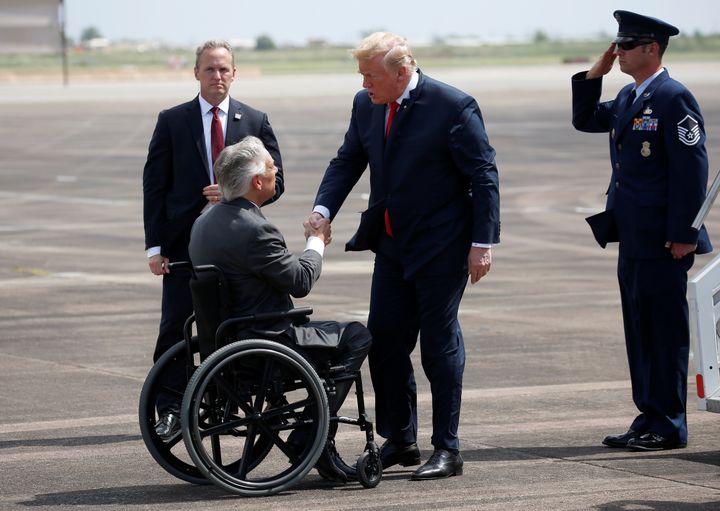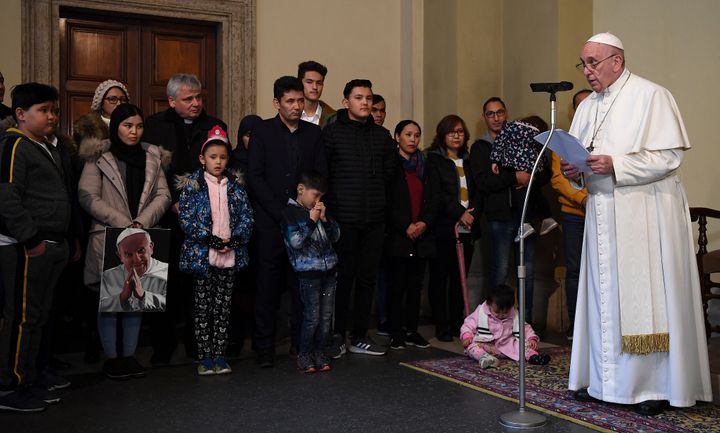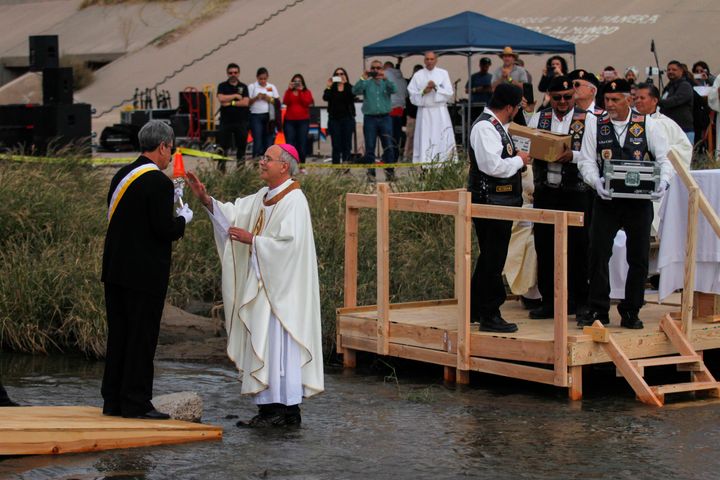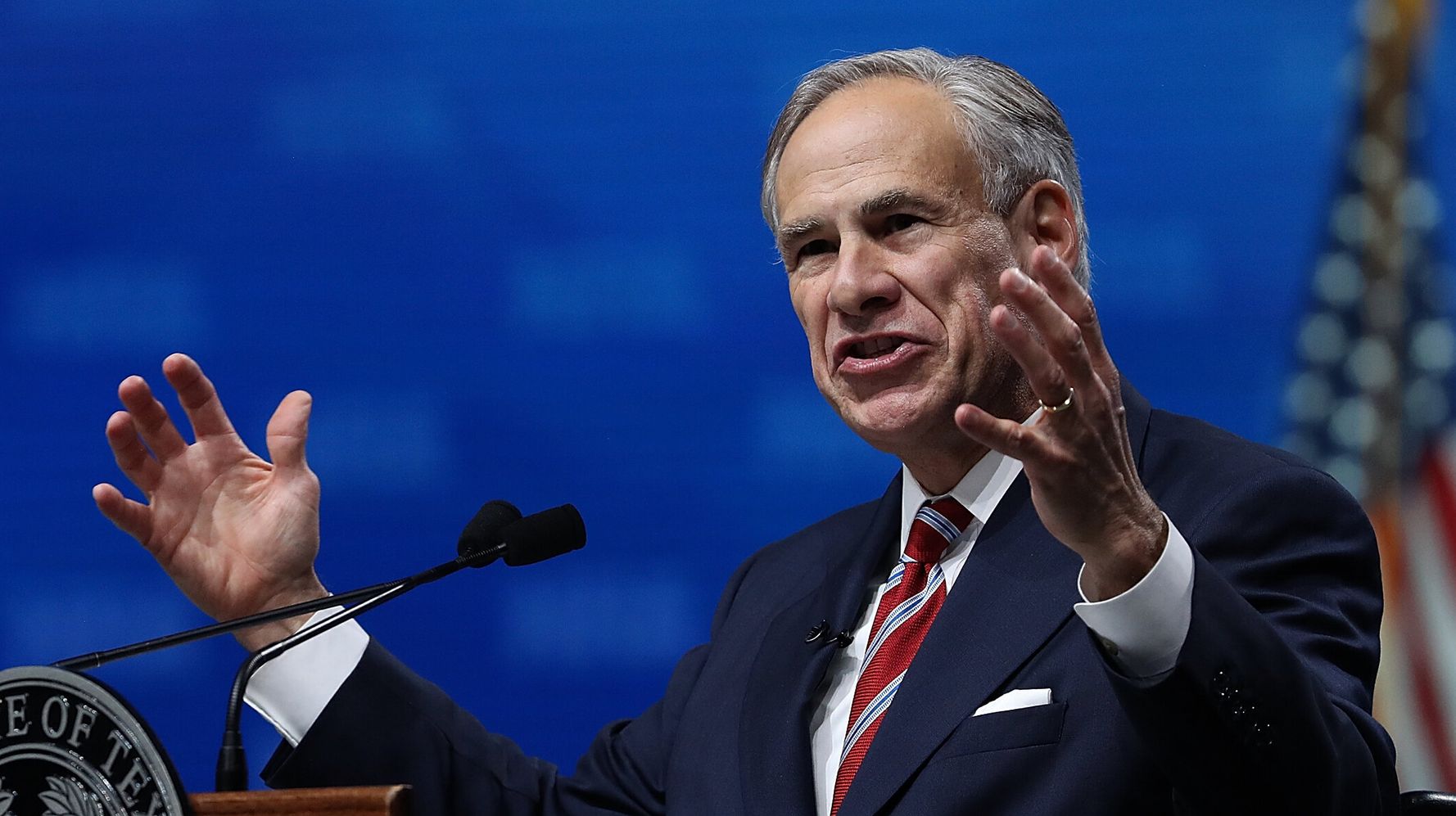[ad_1]
The Roman Catholic bishops of Texas are roundly criticizing Gov. Greg Abbott’s recent decision to end the official resettlement of refugees in Texas.
The Republican governor, who identifies as Catholic, announced Friday that Texas will be taking advantage of President Donald Trump’s recent executive order allowing individual states to refuse to participate in the federal refugee resettlement program.
The 16 Catholic bishops based in Texas quickly responded with a joint statement calling Abbott’s decision “misguided.”
“It denies people who are fleeing persecution, including religious persecution, from being able to bring their gifts and talents to our state and contribute to the general common good of all Texans,” the Texas Catholic Conference of Bishops wrote in their statement. “The refugees who have already resettled in Texas have made our communities even more vibrant.”
“As Catholics, an essential aspect of our faith is to welcome the stranger and care for the alien,” the bishops added.

Abbott’s decision could have a crucial impact on refugee resettlement during a period when Trump has already slashed refugee admissions to historically low levels. During the federal government’s 2019 fiscal year, which ended on Sept. 30, Texas resettled more new refugees than any other state, according to the Pew Research Center. And since the 2002 fiscal year, Texas has resettled about 88,300 refugees, second only to California.
Abbott said Friday that Texas has done “more than its share” in assisting the refugee resettlement process.
“At this time, the state and non-profit organizations have a responsibility to dedicate available resources to those who are already here, including refugees, migrants, and the homeless ― indeed all Texans,” Abbott wrote in his letter.
As a Catholic, Abbott has cited his faith to support anti-abortion and other conservative policies. But on the issue of refugees, the governor’s stance sharply diverges from the official positions of his church ― and the example set by Pope Francis.
The pope has long been a vocal advocate for refugees and has called on the nations of the world to take in as many refugees as possible. In December, Francis gave 33 refugees from Afghanistan, Cameroon and Togo a chance to build new lives in Italy. Their resettlement was financed by the Holy See and by the Community of Sant’Egidio, a Catholic charity.

American Catholic groups have been heavily involved in refugee resettlement. The U.S. Conference of Catholic Bishops is one of nine volunteer agencies that contract with the federal government to resettle refugees.
This isn’t the first time Abbott has tried to stop refugees from coming to Texas. After terrorist attacks in Paris in 2015, the governor and other Texas Republican officials tried to prevent the Obama administration from sending Syrian refugees to their state. Abbott claimed that Syrian refugees posed a security threat because “any one of [them] could be connected to terrorism.”
Back then, he told the San Antonio Express-News that while individual Christians have a biblical responsibility to be charitable, the government has a different biblically mandated task ― to protect the “safety and security of its people.”
Bishop Michael Olson, who leads the Catholic Diocese of Fort Worth, suggested last week that security isn’t an issue with these new refugees.
“These refugees are people who have followed the legal vetting process in the United States and that President Trump has approved,” Olson said in a statement on Friday. “They have been screened and identified by the federal immigration administration and scheduled to arrive this year.”
Most new refugees have a family member or friend in the U.S. that they hope to unite with, news site Crux reports. Abbott’s decision means that for the next fiscal year, refugees won’t be able to initially settle near loved ones in Texas ― although they could move to Texas after first being received by another state.
In response to HuffPost’s questions, John Wittman, a spokesman for Abbott, did not address the governor’s apparent break with Catholic teaching. He emphasized that Abbott’s decision won’t prevent refugees from coming to the U.S. or stop refugees from moving to Texas after initially settling in another state.
“No one seeking refugee status in the United States will be denied that status because of the Texas decision,” Wittman said.
Matthew Wilson, a scholar at Dallas’ Southern Methodist University who is studying the political behavior of American Catholics, told HuffPost that he doesn’t think Abbott will pay a political price among Catholic voters for this decision.
“The refugee issue is not especially central for most voters, and American Catholics are notorious for rejecting their leaders’ guidance when it comes to morally-tinged political issues, whether that guidance tries to push them leftward or rightward,” he said in an email. “Thus, you find large numbers of Catholics (especially less devout ones) who support legal abortion, gay marriage, the death penalty, and restrictive immigration policies, despite church teachings to the contrary.”

Under Trump’s executive order, issued in September of last year, the administration requires resettlement agencies to obtain written consent from state and local officials before resettling refugees. Texas is the first state to say no. Forty-two other states have agreed to continue welcoming refugees, according to the Associated Press.
Three faith-based refugee resettlement agencies have requested a preliminary injunction that would stop the Trump administration from enforcing the executive order. (The U.S. Conference of Catholic Bishops is not a plaintiff in that case.) A federal judge in Maryland is expected to issue a decision on that matter this week.
Calling all HuffPost superfans!
Sign up for membership to become a founding member and help shape HuffPost’s next chapter
[ad_2]
Source link

